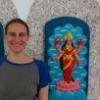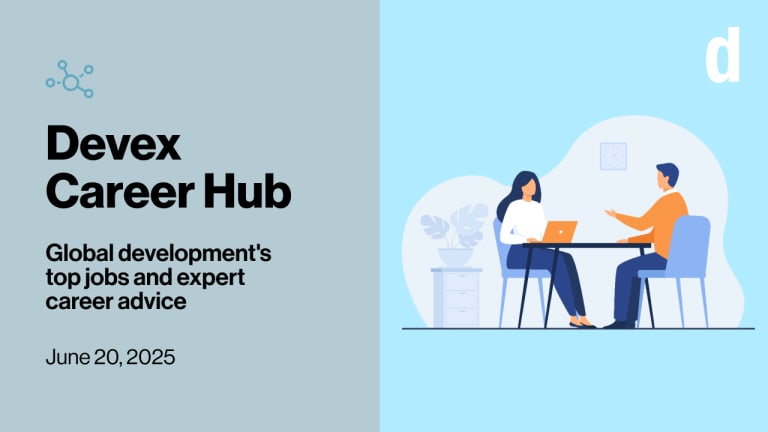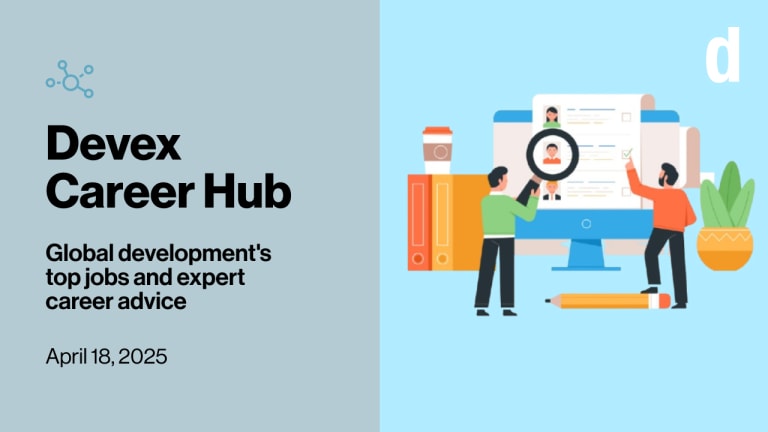UNDP seeks experts to work in development hot spots
<p>The United Nations Development Program is particularly hiring for energy, environment, peace and security initiatives. Here’s how to land the job.</p>
The United Nations Development Program may make the list of top organizations to work in international development. But applicants beware: A job with UNDP could mean staying in some of the world’s hot spots. UNDP offers a wide range of openings for people with backgrounds in international development and related areas for duty stations across Africa, Latin America, Asia, Europe and North America. But according to UNDP’s recruitment chief Michael Emery, anyone who wants to work for the agency must be “prepared to spend time in some difficult places,” primarily because most of the job opportunities are found there. “In terms of the peace and security side of the house, the money is flowing to Darfur, to Congo, and to some extent West Africa,” Emery said. “Substantively or thematically, it’s flowing to peace and security, to environment and energy. At the moment that’s where we advertise large numbers of jobs.” What UNDP is looking for UNDP wants people who can communicate advice and innovative ideas across cultures. It always needs people with strong administrative skills and backgrounds in finance and accounting. “Having qualifications in accounting or procurement of any kind, particularly in finance or budgets, is attractive,” Emery said. “People with those qualifications are very marketable in the private sector, and generally we find it difficult to match those kinds of salaries.” For professional positions, candidates need at least a master’s degree, preferably in economics, international relations, or international development. Mid-level professional positions at the P-3 level also require five years of relevant experience, while P-4 appointments require an additional two years, according to Emery. Some job announcements, particularly for senior economist positions, indicate “PhD preferable,” which means that candidates would need a doctorate to be competitive. But such instances are rare. Emery stressed that UNDP needs a vast array of professionals including accountants, auditors and human resources specialist. “It’s kind of like a bag of lollies,” he said. “There’s something for everybody at UNDP.” Hiring quotas and diversity Diversity is an important factor in hiring at international organizations such as UNDP. “UNDP works on a male/female, north/south diversity quadrant,” Emery said. “When looking at an office or organizational unit mix, we like to have an appropriate blend of cultural and gender perspectives. We really do like to mix it up a bit, so that’s an important variable for us.” Certain nationalities are underrepresented at UNDP, and the organization tries to give them priority. However, UNDP does not have the same hiring quotas like the U.N. Secretariat, where posts are subject to geographical distribution. “The quadrants that are most important in that regard are the two female quadrants, because we’re trying to achieve equity in our professional categories by 2012,” he said. How to locate job opportunities According to Emery, the agency invites applications for about 500 positions - 200 for for staff positions, both national and international, and the rest for consulting assignments - per month. Jobs are posted on UNDP’s Web site and ReliefWeb. But for senior positions that are difficult to fill, the agency advertises in the Economist, Jeune Afrique, the Wall Street Journal and other publications. Devex also posts UNDP job notices. Applying for positions UNDP’s online application form asks applicants to indicate their contact details as well as information on education and proficiency in the official U.N. languages Arabic, French, Spanish, English, Russian and Chinese. Candidates should submit their resume, although UNDP is increasingly encouraging the use of the U.N. personal history, or P-11, form. Because UNDP does not perform keyword searches on resumes, using certain words will not necessarily increase a candidate’s chances of getting a position. Nonetheless, applicants should prepare their application with care. “You really do need to spend a day or half a day looking at the vacancy announcement, analyzing the competencies, using your networking to figure out why the position is actually vacant, and then tailoring your application accordingly.” Emery said. “If you know an organization is about to go through a major change process, then emphasize your change management skills.” Emery appreciates evidence of volunteer work, which he said is “an important indicator of a value proposition in an individual.” Applicants should also provide a statement of motivation of not more than 1,000 characters, explaining why they would be an excellent candidate for the position. They must address the questions: Why do you want to work for UNDP? What excites you about the position? Emery recalled one applicant who said she was motivated with the prospect of moving to America to be closer to her daughter. “That’s not really a strong motivation for us,” he said. “We want somebody who wants the job because they have a commitment to the world’s most marginalized people.” Application screening After receiving applications, UNDP begins assessing applicants’ experience and education. It weeds out anyone who does not have the minimum qualifications to do the job. “A lot of people make the mistake of thinking, ‘Okay, well, I don’t quite have the experience, but I think I can do the job anyway,’” Emery remarked. “One thing the U.N. system as a whole is quite good at is counting. We do actually go back and count the months of relevant experience, and unfortunately internships do not count.” Candidates should understand that the application process will take time. “It’s amazing when people apply for a job, and the day after it closes they ring me up and want to know if they’ve been short-listed,” Emery said. UNDP looks at the more qualitative aspects of the application following the initial screening. At this point, it removes people based on the objective criteria of the vacancy. Thus an applicant without working experience in Africa will be removed from the completion if the job announcement says “Africa experience required.” From long list to short list UNDP generates a long list of applicants, which could be anywhere between five and 25 applicants. At this stage, it normally conducts a technical test, which is outsourced for jobs involving auditing or finance functions. “Sometimes we do an in-house technical test,” Emery said. “It might be something very simple like, ‘Here’s a strategic plan; you’ve got three hours to prepare a briefing note to the hiring manager on the key elements of the strategic plan.’ You see very quickly which people have the cognitive ability and the analytical ability to process information and do that quickly.” On the basis of testing and reference checks, UNDP short-lists applicants. The organization generally puts three to four people for interview. Interview essentials UNDP uses competency- or behavior-based interviewing. A suit is the appropriate attire when interviewing for a job at the agency’s headquarters. The interview involves a panel. Candidates should not inquire about its members as this is considered inappropriate. They are expected to sit for 45 minutes, after which the panel deliberates for 15 minutes. “We want people that are succinct, clear, logical and articulate,” Emery said. During interviews, UNDP likes to get a sense of what motivates people. Being enthusiastic certainly helps. The organization employs a five-point rating scale to rank competencies. Emery used Microsoft PowerPoint proficiency as example to explain the process. “If you don’t know what PowerPoint is, that’s a zero; if you can open a PowerPoint presentation, that’s a one,” he said. “If you can open a basic PowerPoint presentation and start populating it and putting some words in, that’s a two. If you can do a nice one - throw a few pictures in, a few graphs - that’s a three.” Four points are given to applicants that can add music, graphics and animation, and five points if they wrote a program for PowerPoint, he added. When UNDP is assessing candidates against competencies, panel members consider the depth and complexity of examples. “One candidate gave us an example of resolving a conflict between two interns; towards the end of their internship they all got along really well, and it was lovely,” Emery said. “The next candidate gave us an example of solving a very difficult local staff issue in a very complex conflict zone with 200 staff that was particularly volatile,” he continued. “It wasn’t a good result, but what they could explain in terms of process and how they had to negotiate certain positions demonstrated a much greater depth and complexity in terms of conflict resolution.” According to Emery, applicants make many mistakes during the part of the interview when they ask the panel questions. He warned against inquiring about benefits and entitlements. “That’s available on the Web site, so there’s no need to ask,” he said. Also, it helps to be sensible. “I’ve had candidates who, when it’s their turn to ask questions, ask such a question that’s designed to trick the panel, sort of showing off to the panel,” Emery said. “That’s a bit of a red flag for us.” At the end of the interview, candidates should remember to thank the panelists for their time. Final stages On the basis of the competency-based interview and other assessment metrics, UNDP’s human resource staff makes a recommendation to the hiring manager. The hiring manager then comes up with a decision based on a holistic assessment of candidates and what is required in the post. An advisory body will then consider and approve the position. Emery stressed that the process can sometimes take a bit of time, typically about 100 days from the date when the vacancy is first advertised to an offer of appointment. But he said that the pace has increasingly become faster. “While that’s very long compared to the corporate sector,” he said, “it’s actually better compared to other organizations in the multilateral sector.” Read more U.N. career advice: - Development Aid Careers in the United Nations System: What You Need to Know - UN Jobs: What You Need to Know - Five Insider Tips for Acing a UN Online Job Application - UN Job Perks: What You Need to Know - UN Salaries: What You Need to Know - UN Occupational Groups: A Primer - The Other UN Career: Working with its Nonprofit Partners - Network Your Way into the UN - Jobs at UN Programs: A Primer - Jobs at UN Specialized Agencies: A Primer - UN to Introduce Online Application Tool for Consultants - UN Association Offers Future Leaders a Chance to Test Their Skills - UN-Habitat Official: Urban Planners Must be ‘More Specialized’ - UNDP Taps Local Talent for Lebanon Projects - IOM Seeks Practical Skills in Volatile Locations - A Great Career Stepping Stone: UNDP’s Junior Professionals Program - Joining the United Nations Volunteers Read more career advice articles.
The United Nations Development Program may make the list of top organizations to work in international development. But applicants beware: A job with UNDP could mean staying in some of the world’s hot spots.
UNDP offers a wide range of openings for people with backgrounds in international development and related areas for duty stations across Africa, Latin America, Asia, Europe and North America.
But according to UNDP’s recruitment chief Michael Emery, anyone who wants to work for the agency must be “prepared to spend time in some difficult places,” primarily because most of the job opportunities are found there.
This story is forDevex Promembers
Unlock this story now with a 15-day free trial of Devex Pro.
With a Devex Pro subscription you'll get access to deeper analysis and exclusive insights from our reporters and analysts.
Start my free trialRequest a group subscription Printing articles to share with others is a breach of our terms and conditions and copyright policy. Please use the sharing options on the left side of the article. Devex Pro members may share up to 10 articles per month using the Pro share tool ( ).
Ingrid is an independent writer and editor who has contributed to Devex and many other publications. She worked as a staff writer for Vault.com from 2007 to 2009, helping to write guidebooks, including the "Vault Guide to the Top Government and Nonprofit Employers." She was also a researcher for National Geographic Traveler magazine in Washington, D.C. Ingrid holds a master's in journalism from the University of Missouri. As the daughter of a U.S. diplomat, she grew up all over the world.




